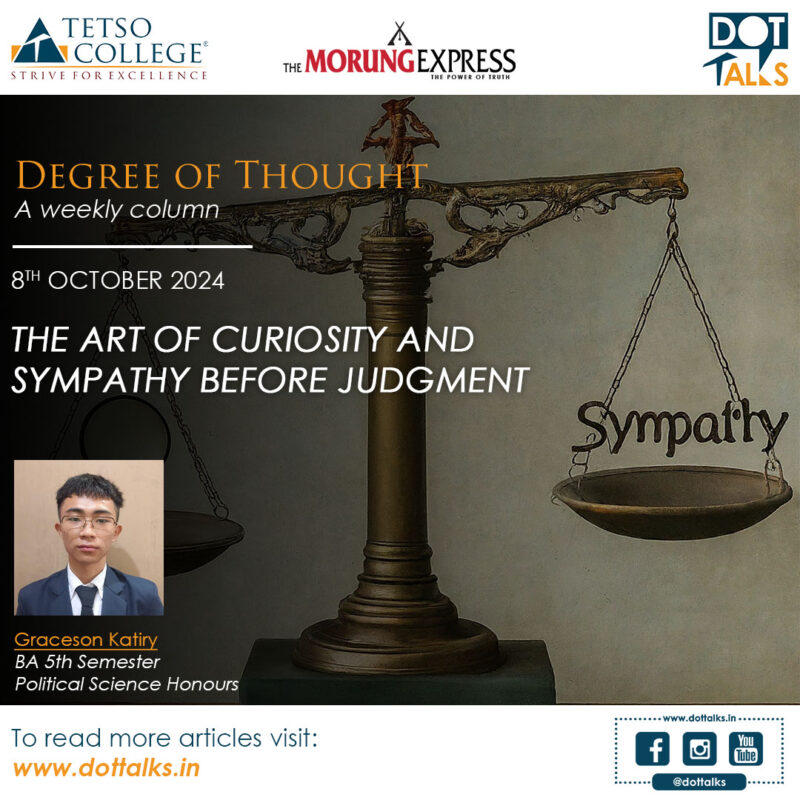The Art of Curiosity and Sympathy Before Judgment
In a society that thrives on quick reactions and instant impressions, it is easy to form stereotypes about individuals before looking into the reasons behind their behaviours. Once someone slips up from the expected parameters and expectations, every individual is ready to condemn and judge them. But first things first, perhaps we should be able to contain this tendency by practising these two virtues: curiosity and sympathy, rather than jumping to conclusions.
Curiosity: The Desire to Understand
The first step in encouraging a deeper comprehension is curiosity. When encountering ‘foreign’ behaviours, it is common to dismiss them as odd, weird, or even inappropriate. However, what if instead of labelling someone, we would approach the situation with more of a how and why instead? What if we ask ourselves questions like, “What makes them so enraged to react in such a manner?” or “What kind of situation is happening in their life that I am unaware of?” That’s the essence of curiosity – it helps us pause, reflect and go beneath the surface instead of forming snap judgements, hasty conclusions or assumptions.
This approach asks us to be humble, look beyond our own experiences and admit that we do not have the answers to everything. Every person has their narrative, a previous life, a set of distinct flaws and experiences they have faced. Curiosity creates the opportunity to understand in place of judgement.
Sympathy: The Power of Compassion
What comes next after curiosity has been sparked is what you would ask yourself. And the answer is “Sympathy”. Sympathy involves placing ourselves in the other person’s shoes and trying to relate. It is the emotional side of understanding. When someone behaves in a way that seems unusual or out of character, they might be facing struggles and uncertainties which we cannot see, such as stress, loss, confusion, or fear. Practising sympathy allows us to acknowledge their humanity and offer grace instead of criticism and judgement.
Sympathy, however, doesn’t mean excusing harmful behaviour, but it does mean recognizing that most people are doing the best they can with what they have. Sympathy encourages us to show compassion and offer support rather than judging them.
Why Are We Quick to Judge?
Judging people is often a defence mechanism. It makes us feel like we’re in control or superior when we point out someone else’s faults. In our fast-paced world, reaction greatly overpowers reflection. A prime example of this is social media. Social media has influenced us to make quick judgments based on a single post or comment, often without looking at the bigger picture for what it could be. However, in real life, it’s entirely different. People are much more complex than what we assume them to be. There is always more beneath what we can see.
When we choose to make snap judgements, we give up the opportunity to build connections. By choosing to label someone without seeing the whole picture, we close the door on understanding. This can create distance, breed misunderstandings, and even contribute to feelings of isolation and division.
The Benefits of Practising Curiosity and Sympathy
The art of choosing curiosity and sympathy over judgement creates a space for growth not only for ourselves but also for others. Besides growth, we also build stronger relationships based on the foundations of trust and mutual understanding. People feel seen and valued when they know someone is genuinely interested in their story rather than just making assumptions.
Furthermore, practising this art helps generate more patient and empathetic individuals. Instead of limiting ourselves to the constraints of our own perspectives, it encourages us to learn from the rich, varied experiences of people. Eventually, curiosity and empathy help us grow not only in our relationships with people but also in our broader understanding of the world.
In our daily interactions, we will undoubtedly come across people who act in ways that puzzle or frustrate us. When this happens, we have the liberty to choose either to judge or to seek to understand. The art of curiosity and sympathy invites and compels us to pause, reflect, and offer compassion before forming opinions. After all, it’s everyone’s first time living life, and we could all benefit from being a little gentler and kinder to each other. By doing so, we create a world that is more compassionate, understanding, and connected.
“Who am I to judge others when I, too, walk imperfectly?”
Degree of Thought is a weekly community column initiated by Tetso College in partnership with The Morung Express. Degree of Thought will delve into the social, cultural, political and educational issues around us. The views expressed here do not reflect the opinion of the institution. Tetso College is a NAAC Accredited UGC recognised Commerce and Arts College. The editorial team includes Chubamenla, Asst. Professor, Dept. of English and Rinsit Sareo, Asst. Manager, IT, Media & Communications.
For feedback or comments please email: dot@tetsocollege.org


